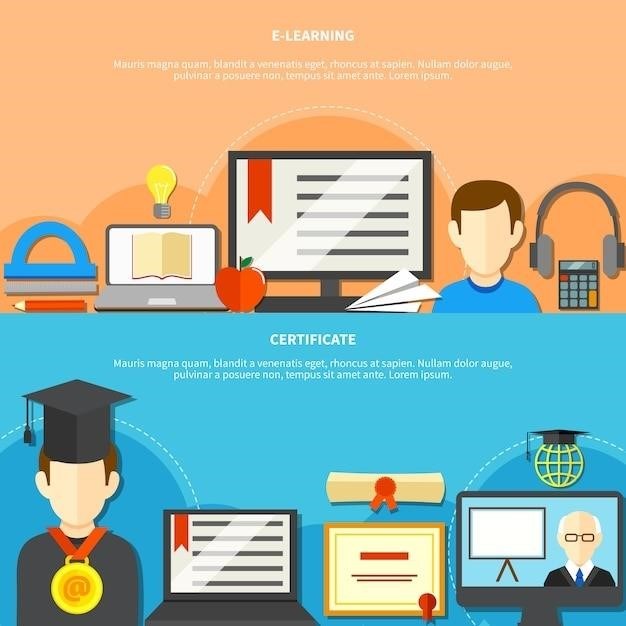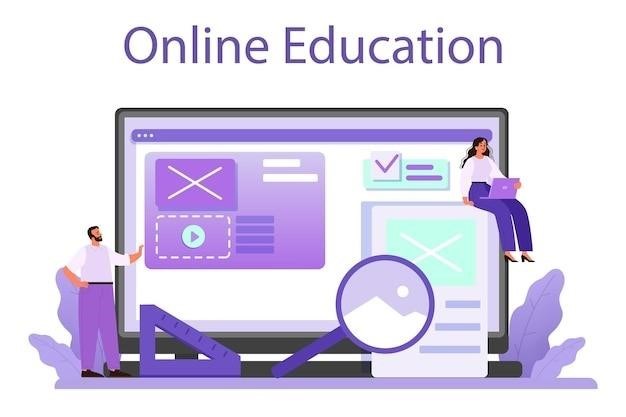Curriculum and Instruction Certificate Programs Online⁚ A Comprehensive Guide
This guide explores online certificate programs in curriculum and instruction, examining program structures, accreditation, curriculum design, technology integration, assessment strategies, flexibility, admission processes, career paths, costs, and future trends. It highlights diverse program offerings and helps prospective students choose the right fit.
Program Overview and Benefits
Online Curriculum and Instruction certificate programs offer a flexible pathway for educators to enhance their skills and knowledge. These programs typically consist of a focused curriculum designed to deepen understanding of pedagogical approaches, curriculum development, and assessment strategies. The benefits are numerous, including the convenience of online learning, allowing professionals to pursue professional development without disrupting their current work schedules or geographic location. Many programs are designed to be completed in a relatively short timeframe, allowing for quick acquisition of new skills and immediate application in professional settings.
Furthermore, these certificates often provide opportunities to specialize in specific areas of interest within curriculum and instruction, such as technology integration, specific grade levels, or particular subject matter. The accessibility of online programs expands educational opportunities to a broader range of educators, regardless of their location or prior commitments. Upon completion, graduates often find themselves better equipped to design engaging and effective learning experiences, leading to improved student outcomes. The enhanced skills and knowledge gained can lead to increased career opportunities and higher earning potential.
Accreditation and Program Recognition
Accreditation is a crucial factor when considering online curriculum and instruction certificate programs. Accreditation signifies that a program meets certain quality standards and has undergone a rigorous review process by a recognized accrediting agency. This accreditation is vital for several reasons. Firstly, it ensures that the program’s curriculum is current, relevant, and aligned with best practices in the field of education. Secondly, accreditation often impacts the recognition of the certificate by employers and other educational institutions;
Graduates from accredited programs are more likely to have their credentials recognized and valued by potential employers. Furthermore, accreditation can influence the transferability of credits should a student decide to pursue further education, such as a master’s degree. Therefore, prospective students should carefully investigate the accreditation status of any program they are considering. Looking for accreditation from nationally recognized agencies ensures the program adheres to high standards of academic excellence and provides a valuable credential for career advancement. The lack of accreditation can significantly diminish the value and recognition of a certificate.

Curriculum Design and Development Focus
Online curriculum and instruction certificate programs place significant emphasis on the principles and practices of curriculum design and development. These programs equip educators with the skills to create effective, engaging, and standards-aligned learning experiences for diverse learners. A core focus often includes understanding learning theories, instructional strategies, and assessment methods. Students learn to analyze existing curricula, identify areas for improvement, and develop innovative approaches to teaching and learning. The curriculum may cover various aspects of curriculum development, such as backward design, understanding learning objectives, creating engaging learning activities, and aligning assessments with learning goals.
Furthermore, many programs incorporate a strong focus on technology integration into curriculum design. This includes exploring various educational technologies, digital tools, and online learning platforms to enhance teaching and learning. The ability to design effective online courses and leverage technology to support student learning is a critical skill emphasized in these programs. Additionally, instructional design models and methodologies are explored, enabling educators to structure learning experiences in a way that maximizes student engagement and achievement. The overall goal is to produce educators who are skilled in creating high-quality, effective curricula that meet the evolving needs of students and the educational landscape.
Technology Integration in Online Instruction
Effective technology integration is a cornerstone of successful online curriculum and instruction. Certificate programs delve into the pedagogical applications of various technologies, equipping educators with the skills to leverage digital tools to enhance teaching and learning. This includes exploring Learning Management Systems (LMS) like Canvas or Blackboard, understanding their functionalities, and designing engaging online learning experiences within these platforms. The programs often cover the creation of multimedia content, such as interactive presentations, videos, and simulations, to cater to diverse learning styles. Furthermore, students learn how to utilize various educational technologies for assessment, communication, and collaboration, fostering a dynamic and interactive online learning environment.
Beyond the technical aspects, these programs emphasize the pedagogical considerations of technology integration. This involves understanding how technology can be used to support different learning objectives, promote student engagement, and facilitate effective communication between instructors and students. Students learn to select appropriate technologies based on pedagogical goals and to design technology-enhanced learning activities that align with learning objectives. The focus is on using technology not as a mere tool, but as a catalyst for innovative teaching practices, creating a rich and stimulating online learning experience that maximizes student success and engagement.

Assessment and Evaluation Strategies
Online certificate programs in curriculum and instruction place significant emphasis on diverse assessment and evaluation strategies suitable for the digital learning environment. These programs go beyond traditional methods, exploring formative and summative assessments designed to effectively gauge student understanding in online settings. Students learn to design assessments that accurately measure learning outcomes while addressing the unique challenges of online instruction. This includes exploring various assessment tools, such as online quizzes, discussions, projects, presentations, and simulations, each chosen to align with specific learning objectives.
Furthermore, the programs cover the critical aspects of providing meaningful feedback to students in online environments. This includes learning effective techniques for providing timely and constructive feedback on various assessment types, fostering student learning and improvement. The importance of using technology to streamline the assessment process and enhance efficiency is also addressed, with an exploration of automated grading tools and other technological aids. The programs equip educators with the skills to create a comprehensive assessment plan that aligns with learning objectives, uses a variety of assessment methods, and provides students with valuable feedback to enhance their understanding and skills.
Program Flexibility and Accessibility
Online curriculum and instruction certificate programs are designed with flexibility and accessibility as core principles. Recognizing the diverse needs and schedules of working professionals and educators, these programs offer asynchronous learning options, allowing students to access course materials and complete assignments at their own pace and convenience. This flexibility extends to course scheduling, with many programs offering multiple start dates throughout the year to accommodate various commitments.
Accessibility is another key feature, ensuring that the programs are inclusive and cater to learners with diverse needs. Online platforms often provide features such as closed captioning, text-to-speech functionality, and adjustable font sizes, making the learning materials more accessible to a wider range of students. Furthermore, many programs offer technical support and readily available resources to assist students with any technological challenges they may encounter. The emphasis on flexibility and accessibility ensures that individuals from diverse backgrounds and with varying schedules can successfully participate in and complete these certificate programs.
Admission Requirements and Application Process
Admission requirements for online curriculum and instruction certificate programs vary across institutions but generally include a bachelor’s degree, often in a related field like education. Specific requirements might include a minimum GPA, official transcripts, letters of recommendation, and a statement of purpose outlining the applicant’s goals and how the certificate program aligns with their professional aspirations. Some programs may also require standardized test scores, such as the GRE or GMAT, although this is becoming less common for certificate programs.
The application process typically involves submitting the completed application form, along with all required supporting documents, through the institution’s online portal. Applicants should carefully review the specific requirements and deadlines for each program. Once submitted, applications are reviewed by the admissions committee, who evaluate the applicant’s qualifications based on the stated criteria. Successful applicants will receive an acceptance letter outlining program details, including tuition fees, enrollment instructions, and course schedules. The entire process is usually straightforward and well-documented on the respective university websites, ensuring a clear and transparent application experience for prospective students.
Career Paths and Professional Development
An online Curriculum and Instruction certificate opens doors to various career paths within the education sector. Graduates can enhance their roles as classroom teachers, taking on curriculum development responsibilities within their schools or districts. The certificate provides a strong foundation for aspiring curriculum specialists, instructional designers, or educational consultants. Many find opportunities in teacher training and professional development, sharing their expertise with other educators. Those with a focus on technology integration can pursue roles in educational technology companies or as e-learning specialists.
Beyond specific job titles, the certificate fosters continuous professional development. The skills gained—curriculum design, assessment strategies, and technology integration—are highly transferable and valuable across educational settings. Graduates are better equipped to lead instructional initiatives, advocate for improved teaching practices, and contribute to innovative educational approaches. The advanced knowledge allows for increased leadership roles within schools, providing opportunities for career advancement and greater impact on student learning. The certificate serves as a credential that demonstrates commitment to professional growth and expertise in curriculum and instruction.
Cost and Financial Aid Options
The cost of online Curriculum and Instruction certificate programs varies significantly depending on the institution, program length, and credit hours required. Some programs may charge per credit hour, while others offer a flat tuition rate. It’s crucial to research individual program costs thoroughly before enrolling. Factors such as program reputation and location (state residency may affect tuition) also contribute to the overall expense.
Fortunately, several financial aid options can help offset the cost of these programs. Many institutions offer scholarships specifically for graduate education or for students pursuing certificates in specific fields like curriculum and instruction. Some universities provide institutional grants or tuition waivers based on merit or financial need. External scholarships, such as those offered by professional organizations or private foundations, are another valuable resource. Federal student loans, including Grad PLUS loans, can also be used to finance the program, though it’s essential to carefully evaluate the repayment implications.
Exploring all available funding options is highly recommended. Contacting the financial aid office of the chosen university and researching external scholarship opportunities will maximize the chances of securing funding to make the program affordable.
Specific Coursework Examples
The specific coursework within online Curriculum and Instruction certificate programs varies depending on the institution and program focus, but common themes emerge. Many programs include courses focusing on curriculum design and development, exploring various models and theories for creating effective learning experiences tailored to diverse student populations. Instructional strategies are a key component, covering different teaching methodologies and their application in various learning environments, including online settings.
Assessment and evaluation form another significant part of the curriculum. Courses often delve into creating and implementing various assessment methods, analyzing data to inform instructional decisions, and ensuring fair and equitable evaluation practices. Technology integration is another common element, with courses exploring the use of educational technology to enhance learning outcomes and create engaging online learning experiences. Some programs may also include specialized courses focusing on specific age groups (e.g., early childhood education, secondary education), subject areas, or educational settings.
Finally, many programs incorporate a practical component, often involving the creation of a curriculum project or portfolio demonstrating the application of learned concepts and skills. Reviewing the specific course descriptions of a program is crucial to understanding the exact content covered.
Choosing the Right Online Program
Selecting the ideal online Curriculum and Instruction certificate program requires careful consideration of several key factors. First, assess your career goals. Are you aiming for a specific role, such as curriculum specialist or instructional designer? Different programs cater to varying career aspirations. Next, examine program accreditation. Accreditation from reputable organizations ensures quality and enhances credibility. Check for regional or national accreditation to validate the program’s standards.
Consider the program’s curriculum. Does it align with your interests and professional needs? Examine the course offerings, focusing on those that directly support your goals. Also, evaluate the program’s flexibility. Online learning offers flexibility, but programs differ in their scheduling and delivery methods. Choose a program that accommodates your lifestyle and learning preferences. Look for options with asynchronous learning or flexible scheduling to avoid conflicts.
Finally, review the program’s cost and financial aid options. Compare tuition fees and payment plans, exploring potential scholarships or financial aid to make the program affordable. Thorough research and careful consideration of these factors are essential for making an informed decision.
Top Universities Offering Online Certificates
Numerous reputable universities offer high-quality online Curriculum and Instruction certificates. Biola University provides a 12-credit certificate preparing educators for curriculum writing and editing. Elizabethtown College offers a flexible online graduate certificate, ideal for working educators seeking professional development, with both synchronous and asynchronous options; These programs often allow application of credits towards further master’s degrees.
Other institutions, such as Liberty University, provide executive certificates designed to enhance the curriculum planning skills of K-12, college, and university educators. The University of Georgia’s College of Education, a top-ranked research institution, and the University of Virginia’s Curry School of Education also offer strong online programs. Millersville University provides a post-masters certificate focusing on curriculum and instruction supervision, preparing educators for leadership roles.
When researching, check for program rankings and reviews to compare offerings and select a program aligning with your learning style and professional objectives. Consider factors like faculty expertise, curriculum design, and student support services when making your choice. Remember to verify accreditation status before applying.
Future Trends in Online Curriculum and Instruction
The landscape of online curriculum and instruction is constantly evolving. We can expect to see increased integration of artificial intelligence (AI) in personalized learning experiences, adaptive assessments, and automated feedback mechanisms. AI-powered tools will likely assist educators in creating more engaging and effective online learning materials tailored to individual student needs and learning styles. This will lead to more personalized learning paths and improved learning outcomes.
Furthermore, virtual and augmented reality (VR/AR) technologies are poised to revolutionize online learning environments. Immersive simulations and interactive 3D models can create richer learning experiences and enhance student engagement. Expect to see more programs incorporating VR/AR to enhance the delivery of curriculum and instruction. The use of gamification techniques will also likely continue to grow, making online learning more interactive and enjoyable.
Finally, the focus on data analytics and learning science will intensify. Educators will use data-driven insights to continuously improve their teaching methods and course materials. This will create a more evidence-based approach to online curriculum design and instruction, resulting in more effective and efficient learning experiences for students. The emphasis on personalized learning, supported by technology and data, will be a key trend.


